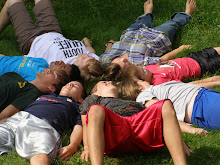The Rt Rev Patrick O'Donoghue, the Bishop of Lancaster, has claimed that graduates are spreading scepticism and sowing dissent. Instead of following the Church's teaching they are "hedonistic", "selfish" and "egocentric", he said.
In particular, the bishop complained that influential Catholics in politics and the media were undermining the Church.
While not naming names, he suggested that such people had been compromised by their education, which he said had a "dark side, due to original sin".
Prominent Catholics in public life include Mark Thompson, the BBC's director general, and Tony Blair, the former Prime Minister.
Bishop O'Donoghue, who has recently published a report on how to renew Catholicism in Britain, argued that mass education has led to "sickness in the Church and wider society".
"What we have witnessed in Western societies since the end of the Second World War is the development of mass education on a scale unprecedented in human history - resulting in economic growth, scientific and technological advances, and the cultural and social enrichment of billions of people's lives," he said.
"However, every human endeavor has a dark side, due to original sin and concupiscence. In the case of education, we can see its distortion through the widespread dissemination of radical scepticism, positivism, utilitarianism and relativism.
"Taken together, these intellectual trends have resulted in a fragmented society that marginalizes God, with many people mistakenly thinking they can live happy and productive lives without him.
"It shouldn't surprise us that the shadows cast by the distortion of education, and corresponding societal changes, have also touched members of the Church. As Pope Benedict XVI puts it, even in the Church we find hedonism, selfishness and egocentric behavior."
The bishop said that Catholic graduates had rejected the reforms made in the second council of the Vatican, which introduced fundamental changes in issues such as liturgy and doctrine.
"The Second Vatican Council tends to be misinterpreted most by Catholics who have had a university education -- that is, by those most exposed to the intellectual and moral spirit of the age," he said. "These well-educated Catholics have gone on to occupy influential positions in education, the media, politics, and even the Church, where they have been able to spread their so-called loyal dissent, causing confusion and discord in the whole church."
Mr Thompson, who went to Oxford University, has this month been embroiled in a row over broadcasting standards in the wake of the scandal over offensive telephone messages left by Jonathan Ross and Russell Brand. Under his command the BBC broadcast Jerry Springer The Opera, considered blasphemous by many Christians, and was forced to pull a cartoon called Popetown set in a fictional Vatican over concerns it would cause offence.
Mr Blair, also Oxford-educated, became a Catholic last year but has received Mass for years. As Prime Minister he oversaw the introduction of laws on gay rights and abortion which the Catholic church opposed.
The bishop said that influential Catholics had set a bad example and corrupted the faith of those who had not gone to university.
"This failure of leadership has exacerbated the even-greater problem of the mass departure from the Church of the working-class and poor," he said. "For example, the relentless diatribe in the popular media against Christianity has undermined the confidence of the ordinary faithful in the Church."
Although the influx of immigrants from Catholic countries in Eastern Europe has buoyed Mass attendance in recent years, there has been a significant decline in the number of indigenous, working-class Catholics.
Attendance at Mass in 1991 was recorded as 1.3 million, representing a drop of 40 per cent since 1963, but it fell further to 960,000 in 2004. The number of priests in England and Wales has slumped by nearly a quarter in 20 years, from 4,545 in 1985 to 3,643 in 2005.
Bishop O'Donoghue has produced a report, Fit for Mission? Church, examining the current problems facing the Church and designed "to enable Catholic men, women and children to resist the pressures to compromise, even abandon, the truths of the Catholic faith".
He says that he supports Catholics receiving a university education, but urges they should be "better-equipped to challenge the erroneous thinking of their contemporaries".
Nicholas Lash, the former Norris-Hulse Professor of Divinity at Cambridge University, called the bishop's comments "extremely grave".
Writing in this week's Tablet - a respected Catholic journal - Prof Lash says: "If he had named a particular university or universities, or particular individuals, he might well have had a series of libel actions on his hands.
"Quite what constructive purpose could possibly be served by such irresponsible and wholesale scapegoating of the educated, I have simply no idea."
Well, I think they went a bit far calling the "Tablet" a respected 'Catholic' journal. Its not particularly respected or Catholic, only somewhat respected by nominal Catholics.
Nominal Catholics . That's the problem. And the problem does come from their mis-education and obtuse refusal to accept Truth and Authority. I don't think it can be all laid at the feet of higher education. Surely the Catholic schools,seminaries, priests and Bishops played a role ? I think this could maybe be categorized as 'reaping what you sow'... (The Bishop of Lancaster is a fresh breeze of Orthodoxy !)
In an interview as Cardinal Ratzinger, the Pope answered the declining numbers of faithful (FAITHFUL) by accepting that the Church may have some suffering ahead, and speculating that the remnant would be FAITHFUL. He wasn't worried about smaller numbers- he had hopes that the youth would be FAITHFUL, joyful Catholics. (He also defined FAITHFUL.)
I think something that the American elections has accomplished for the Catholic Church, is that it has affected a sort of separating of the 'wheat' from the 'chaff'. Here's praying that I end up in the right pile!






















No comments:
Post a Comment